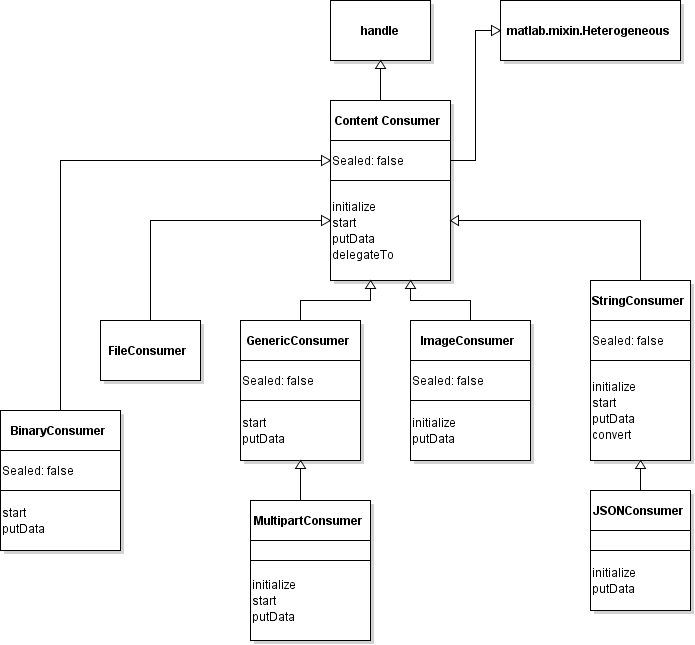matlab.net.http.io.BinaryConsumer 类
命名空间: matlab.net.http.io
超类: matlab.net.http.io.ContentConsumer
HTTP 消息中的二进制数据的使用程序
描述
使用 BinaryConsumer 对象将原始有效负载复制到 Response.Body.Data 属性中。如果指定的使用程序与类型不匹配,则 BinaryConsumer 是 GenericConsumer 的默认使用程序。
BinaryConsumer 类帮助子类编写者在接收原始二进制数据的同时对数据进行检查和处理,可能会将数据转换为要存储在 Response.Body.Data 中的 MATLAB® 数组数据。
matlab.net.http.io.BinaryConsumer 类是一个 handle 类。
创建对象
consumer = BinaryConsumer 构造一个使用程序,从 ResponseMessage 接收二进制数据。
您可以创建此使用程序的子类,以便在接收原始数据的同时检查数据,然后委托此类将数据存储在 Data 中。
属性
公共属性
有效负载的预期长度,指定为 uint64。此属性通常是 Header 属性中的 matlab.net.http.field.ContentLengthField 的 Value 属性。
如果 ContentLength 为空,则长度未知。当调用 putData(uint8.empty) 时,有效负载结束。
MATLAB 在调用 initialize 之前设置此属性,从而为子类提供方便(知道数据长度可能对子类有好处)。
如果此 ContentConsumer 是顶层使用程序的代理,则 ContentLength 的值可能与顶层使用程序的 ContentLength 值不同。
示例: numel(someData),其中 someData 的类型为 uint8
属性:
GetAccess | public |
SetAccess | public |
有效负载的媒体类型,指定为 matlab.net.http.MediaType 对象。此属性通常是 Header 属性中的 matlab.net.http.field.ContentTypeField 的 Value 属性。如果 ContentType 属性为空,则 ContentTypeField 为空或不存在。
MATLAB 在调用 initialize 之前设置此属性,从而为可能需要检查 MediaType 的子类提供方便。如果子类根据数据确定它具有不同的 MediaType,则可以设置此属性。
当传输结束时,MATLAB 将此值复制到 Response.Body.ContentType 属性中。
示例: 'application/octet-stream'
属性:
GetAccess | public |
SetAccess | public |
当前正在处理的有效负载的标头,指定为 matlab.net.http.HeaderField 对象。
使用程序根据此标头确定如何处理发送给它们的有效负载。对于顶层使用程序,此值与 Response.Header 相同。对于代理来说,值可能不同。例如,在 MultipartConsumer 处理的 multipart 消息中,它是此代理正在处理的那一部分的标头。代理仍然可以检查 Response.Header 以获得原始消息的标头。
MATLAB 在调用 initialize 之前设置此属性,从而为子类提供方便。
属性:
GetAccess | public |
SetAccess | public |
发送的已完成的 RequestMessage,指定为 matlab.net.http.RequestMessage 对象。这是所有重定向之后的最后一个 RequestMessage,它是来自 send 方法的 completedrequest 返回值。
MATLAB 在调用 initialize 之前设置此属性,从而为子类提供方便。
属性:
GetAccess | public |
SetAccess | public |
正在处理的 ResponseMessage,指定为 matlab.net.http.ResponseMessage 对象。
MATLAB 在调用 initialize 之前设置 Response 属性。值是收到标头之后、接收有效负载之前的 ResponseMessage。在开始处理响应消息时(如果是 Multipart 消息,则是在开始处理其中一部分时),ResponseMesssage.Body 属性是具有空 Data 和 Payload 属性的 MessageBody 对象。为了存储收到的数据,使用程序可在数据传输过程中修改 Response 和 MessageBody.Data 属性。通常,处理并存储数据的使用程序将 Response.Body.Data 设置为它们处理的有效负载,但这并不是必需的。当传输完成时,MATLAB 将此 Response 返回给 send 的调用方。使用程序不应修改其他 Response 属性,如 Header 或 StatusLine,因为这些更改将返回给 send 的调用方。
Response.Body.Payload 属性在传输过程中为空,使用程序不应尝试修改它。如果设置了 HTTPOptions.SavePayload 属性,在消息或一部分传输结束时(调用 putData(uint8.empty) 之后)或在发生异常时,MATLAB 会将 Payload 设置为已收到的有效负载。
如果在处理消息期间使用程序中发生异常,MATLAB 将抛出 HTTPException 对象。History 属性包含此 Response 值。
如果使用程序是一个代理,负责处理 Multipart 消息中的一部分,则 Response.Header 包含整个消息的标头,而且在为每一部分调用 ContentConsumer 之前会清除 Response.Body 的 Payload 和 Data 属性。在每一部分结束时,新的 ResponseMessage 会添加到原始响应的 Body.Data(包含来自此对象的 Header 和来自此属性的 Body)中的 ResponseMessage 对象数组的末尾。下一个代理会看到一个全新的 Response,它具有一个空 MessageBody,而不是上一个代理的 MessageBody。
属性:
GetAccess | public |
SetAccess | public |
Dependent | true |
正在处理的请求的目标,指定为 matlab.net.URI 对象。此值是由 send 确定的原始目标 URI。它不是代理的 URI 或重定向后的最终 URI。
MATLAB 在调用 initialize 之前设置此属性,从而为子类提供方便。
属性:
GetAccess | public |
SetAccess | public |
受保护的属性
putData 方法为追加附加数据而调用的函数,指定为函数句柄。此类中的 putData 方法调用 AppendFcn 函数,将它在 data 参量中收到的数据追加到响应消息中的现有数据之后。函数必须具有签名:
AppendFcn(consumer,newdata)
其中 newdata 是要追加到数组中 consumer.Response.Body.Data 位置的数据。此方法负责更新 consumer.CurrentLength 以反映 Data 的新长度。如果 newdata 为空,表示流传输结束,则函数应将 Response.Body.Data 更新为其最终值。
如果此属性为空,默认行为将使用内部函数,该函数将 Data 视为支持 horzcat 函数的任意值的数组。它通过预分配空间高效地添加 newdata,使 CurrentLength 保持为存储的数据的实际长度。在消息结束时,它根据 CurrentLength 截断 Response.Body.Data。
如果 horzcat 不适合追加过程,则子类可以更改此属性。例如,当 StringConsumer 构造标量字符串时,它将使用 plus 函数添加到字符串中,而不是使用 horzcat。
不通过调用 ContentConsumer.putData 来追加数据的子类或者对 horzcat 追加数据的行为感到满意的子类可以忽略此属性。
示例: @customAppend,其中 @customAppend 由使用程序定义
属性:
GetAccess | protected |
SetAccess | protected |
接受此使用程序委托的 ContentConsumer,指定为 matlab.net.http.io.ContentConsumer 对象。主调使用程序(委托方)的 delegateTo 方法设置 CurrentDelegate 属性。如果当前没有委托,则值为 []。
在调用 initialize 之前,MATLAB 将 CurrentDelegate 设置为 []。
属性:
GetAccess | protected |
SetAccess | protected |
当前 Response.Body.Data 属性中的数据的长度,指定为 uint64。
当为 Response.Body.Data 预分配的大小大于当前实际存储的数据量时,使用此属性指示存储的数据的长度。如果此属性为空,则说明所有 Response.Body.Data 包含存储的数据,或者 ContentConsumer 子类是以其他方式处理数据,而不是将数据存储在 Response.Body.Data 中。
当 AppendFcn 属性为空时,此属性由 putData 方法在此基类中使用和设置。对于调用 putData 并希望检查已存储数据的子类,以及/或者在 Response.Body.Data 中维护结果的 AppendFcn 的任何实现来说,此属性都很有用。
使用 putData 的子类也可以修改此属性,以重置缓冲区中存储数据的位置。例如,当使用默认的 AppendFcn 函数时,每次调用 putData 时处理所有 Response.Body.Data 的子类可能对原始数据不再有用,因此它可以将 CurrentLength 属性重置为 1,以便下一个 putData 调用用新数据覆盖缓冲区。在新数据结束后,不需要清理缓冲区中的元素。
不调用 putData 的子类可以使用此属性跟踪自己的数据,也可以保留不设置(为空)。MATLAB 对可以在这里设置的值没有任何限制,也不会将其用于其他目的,只是用来确定默认的 AppendFcn 应将下一个数据缓冲区存储在何处以及是否在消息结束时截断数据。在最后一次调用 putData(uint8.empty) 之前将此属性设置为空可以防止截断数据。
MATLAB 在每次调用 initialize 之前将此属性设置为空。
属性:
GetAccess | protected |
SetAccess | protected |
向此使用程序进行委托的 ContentConsumer,指定为 matlab.net.http.io.ContentConsumer 对象。如果此使用程序是一个代理,由另一个使用程序(例如 GenericConsumer 或 MultipartConsumer)调用,则此使用程序就是主调使用程序。在调用 send 时指定的顶层使用程序中为空。
代理可以使用此属性访问委托方的属性,例如,为了确定哪些使用程序向它们进行了委托。
属性:
GetAccess | protected |
SetAccess | protected |
方法
initialize | 配置使用程序以处理新的 HTTP 有效负载 |
start | 开始从 BinaryConsumer 进行 HTTP 传输 |
putData | 保存 BinaryConsumer 的下一个数据缓冲区 |
delegateTo | 委托给另一个使用程序 |
示例
以下使用程序将收到的每一对 uint8 字节合并成一个 int16 字节,并将 int16 数组存储在响应中。
classdef MyBinaryConsumer < matlab.net.http.io.BinaryConsumer
properties
ExtraByte uint8
end
methods
function [len, stop] = putData(obj, data)
if isempty(data)
[len, stop] = obj.putData@matlab.net.http.io.BinaryConsumer(data);
else
if ~isempty(obj.ExtraByte)
data = [obj.ExtraByte; data];
end
len = length(data);
if mod(len,2) > 0
obj.ExtraByte = data(end);
len = len - 1;
else
obj.ExtraByte = uint8.empty;
end
res(1:len/2) = bitshift(uint16(data(1:2:len)),8)+uint16(data(2:2:len));
[len, stop] = obj.putData@matlab.net.http.io.BinaryConsumer(res);
end
end
end
methods(Access=protected)
function bs = start(obj)
obj.ExtraByte = uint8.empty;
bs = obj.start@matlab.net.http.io.BinaryConsumer();
end
end
end
详细信息
版本历史记录
在 R2018a 中推出
MATLAB Command
You clicked a link that corresponds to this MATLAB command:
Run the command by entering it in the MATLAB Command Window. Web browsers do not support MATLAB commands.
选择网站
选择网站以获取翻译的可用内容,以及查看当地活动和优惠。根据您的位置,我们建议您选择:。
您也可以从以下列表中选择网站:
如何获得最佳网站性能
选择中国网站(中文或英文)以获得最佳网站性能。其他 MathWorks 国家/地区网站并未针对您所在位置的访问进行优化。
美洲
- América Latina (Español)
- Canada (English)
- United States (English)
欧洲
- Belgium (English)
- Denmark (English)
- Deutschland (Deutsch)
- España (Español)
- Finland (English)
- France (Français)
- Ireland (English)
- Italia (Italiano)
- Luxembourg (English)
- Netherlands (English)
- Norway (English)
- Österreich (Deutsch)
- Portugal (English)
- Sweden (English)
- Switzerland
- United Kingdom (English)
